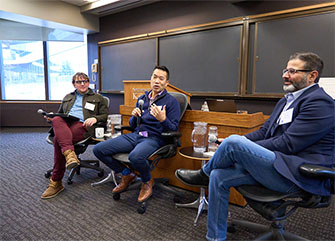Science for a Changing Climate
Trienens Institute Faculty Affiliate Daniel E. Horton studies the intersection of climate change and public health, Northwestern Magazine recounts how his recent work is shaping the future of environmental policy
Symposium panelists talk healthcare, climate vulnerability, and citizen science

In recent years, health clinicians and researchers have recognized the need to prioritize climate change. Calls for proposals on how to prepare for and mitigate its impacts on human health have increased.
Daniel E. Horton, assistant professor in the Department of Earth and Planetary Sciences, moderated a discussion on the topic with panelists Abel Kho, professor of medicine and preventive medicine at the Feinberg School of Medicine, and Raed Mansour, Director of Environmental Innovation at the Chicago Department of Public Health. The panel, “Climate Modeling and Public Health,” took place during the Institute for Sustainability and Energy at Northwestern (ISEN) Annual Symposium held in December 2022.
“We know the impacts of climate change are experienced inequitably in society,” remarked Horton, who also leads Northwestern’s Climate Change Research Group (CCRG) and the Buffett Institute for Global Affairs Defusing Disasters working group. He explained that, with data, it is possible to observe a correlation between environmental, social, and economic indicators.
For example, across the city of Chicago, the panelists noted that there’s a relationship between disparities in health outcomes and vulnerability to climate change related risks. Locations that demonstrate social vulnerability, economic hardship, and high rates of asthma are also more susceptible to flooding, surface heat, and reduced tree canopy. That’s why climate mitigation efforts require collaboration between public health officials, data scientists, healthcare providers, and natural scientists, among others.
Kho, who is also the Director of the Center for Health Information Partnerships (CHIP) and the Institute for Augmented Intelligence in Medicine (IAIIM), works closely with Chicago-area communities. He has observed patterns linking chronic diseases such as asthma and heart disease to climate vulnerability.
In the medical field, electronic health records can be combined with data on social determinants of health to support the administration of a more holistic approach to healthcare that addresses root social and environmental factors.
“Chicago is a unique place to do this work: it is a gritty city that faces up to challenges; communities are very resilient and have stood up on their own to help support their local neighborhoods,” Kho reflected. He has witnessed how health research has been shaped by community-based organizations, such as Pastors4PCOR, a faith-based organization on Chicago’s Southside.
Horton has previously used models to help communities prepare for increased rainfall, predict and design infrastructure to address landslides in high-risk areas, and warn against disease outbreaks related to climate variability. But community resilience will require such models to be made meaningful and useful to the communities they aim to serve.
It can be difficult to move people to adapt behaviors for the sake of climate mitigation or improved public health outcomes. “People don’t like to change. One of the ways to approach that is to use a community based participatory research model where you’re involving the actual community in the making of decisions and the changing of policy with the hope that it is widely embraced,” said Horton.
Panelists went on to discuss how community engagement is taking center stage when it comes to developing programs to address complex issues like climate change. Community members have a role to play, from collecting air temperature data to helping determine the optimal locations of cooling centers. “The public health system is everything: churches, community groups, hospitals, scientists, academia…Everything you do is part of public health,” said Mansour. And, every sector has a role to play in addressing climate change. The 2022 ISEN Annual Symposium served as a meeting point for faculty, partner organizations, and students that will hopefully lead to continued interdisciplinary collaboration.
The two pillars of ISEN’s 2021-25 Strategic Plan are Climate and Energy Transition and Resilient Communities. They shaped the Symposium’s two days of panel presentations that brought together industry professionals and leaders, students, community members, and faculty from across more than twenty disciplines. The “Climate Modeling and Public Health” panel was part of the Symposium’s Resilient Communities track.